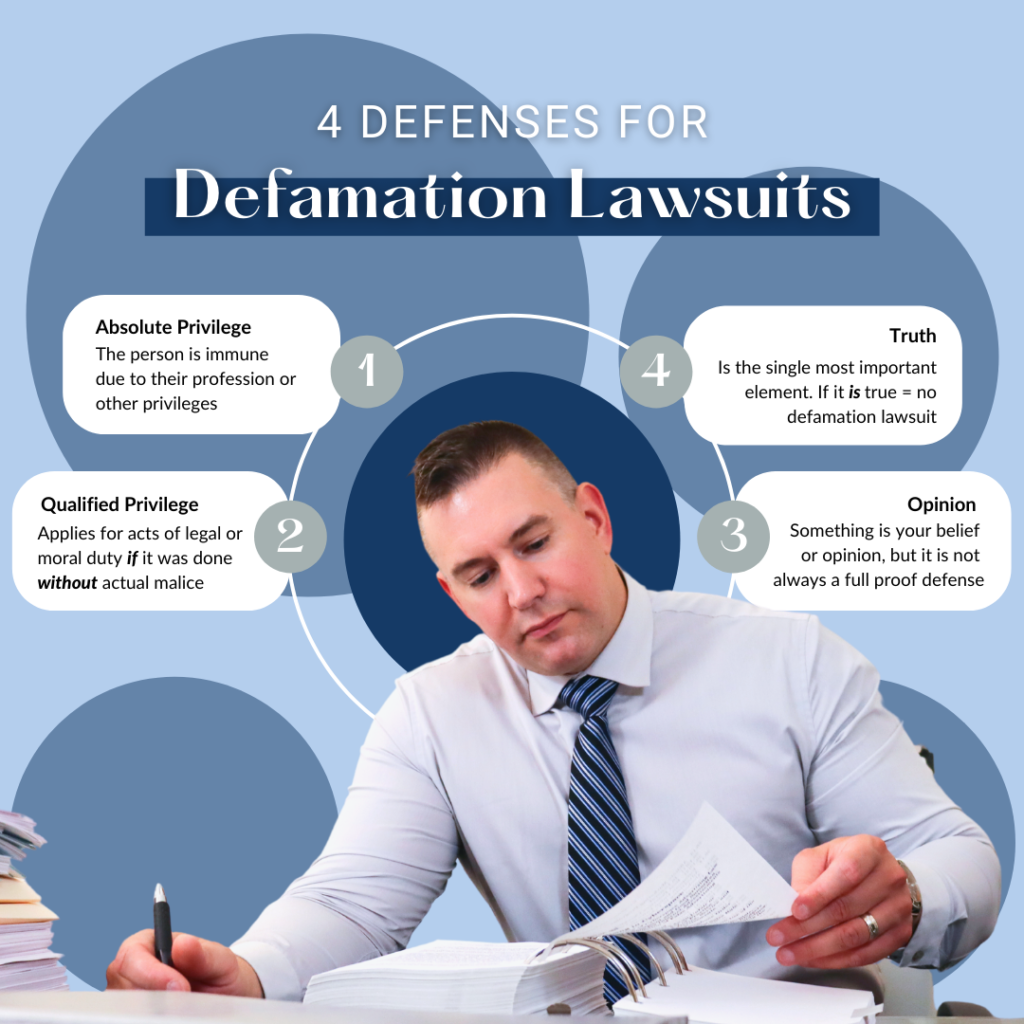Top Defamation Defenses
Top Defamation Defenses

Are you being sued for defamation? Searching for a solid defamation defense? Wondering what to do if you’ve been defamed? We’ve got you covered. Below you’ll find six different defamation defenses that have worked in the past and may work for your case. Don’t keep wondering what are defenses to defamation, scroll down to read now!
Internet Defamation Defense #1: Truth
Truth is an absolute defense for defamation. However, parties might be able to assert other torts like invasion of privacy (of which there are three types, including the form most related to defamation, false light) or intentional infliction of emotional distress. But remember, if the statement in question is proven to be false, the chances of the plaintiff winning a defamation lawsuit increase, significantly.
Internet Defamation Defense #2: Opinion, Hyperbole and Fair Comment
An opinion is a statement that is not capable of being proven objectively true or false. For example, John smells like dead fish and is a jerk. Such a statement, although mean perhaps, would not constitute defamation because whether someone smells like dead fish and is a jerk is very subjective, and, like love, is in the eye (or nose) of the beholder.
Internet Defamation Defense #3: Hyperbole and Fair Comment
How does hyperbole relate to defamation? Well hyperbole is when a statement cannot reasonably be interpreted as stating or implying actual facts given the extreme, rhetorical, or figurative language used. Fair comment is generally considered someone’s right to criticize someone and state their own subjective opinion.
For example, if someone posted on Twitter and said, “Dr. Smith is a blood-sucking vampire,” and Dr. Smith sued the publisher for defamation, the judge may look at the tweet and view it as ridiculous rather than defamatory. I mean, who really is going to believe he’s a vampire anyways?
Reasonable or fair comment is part of the reason why satire and parody aren’t considered to be defamatory.
A myriad of bloggers have avoided libel verdicts by essentially arguing “hyperbolic exaggeration.”
Internet Defamation Defense #4: Absolute Privilege
When statements are absolutely privileged, the speaker is immune from civil liability and courts do not inquire into the declarant’s motives or whether the statements were made in good faith. The absolute privileges created by law are based upon the recognition that certain persons, because of their special position or status, should be as free as possible from fear that their actions in that position might have an adverse effect upon their own personal interest. So what is absolute privilege? In the area of absolute privileges, one of the most common is that involving the participant in judicial proceedings. The socially important interests promoted by the absolute privilege in this area include the fearless prosecution and defense of claims, which leads to complete exposure of pertinent information for the court’s consideration.
Internet Defamation Defense #5: Qualified or Conditional Privilege
First off, it is important to answer what is qualified privilege? The qualified or conditional privilege is another defense to a defamation action. It is based on the social utility of protecting statements required to be made in response to a legal, moral or social duty. It differs from the defense of absolute privilege in that the interest which the defendant is seeking to vindicate is regarded as having an intermediate degree of importance, so that the immunity conferred is not absolute, but is conditioned upon publication in a reasonable manner and for a proper purpose. Without a proper purpose or reasonable manner of publication, the defense fails. For example, if the plaintiff can show an abuse through “actual malice,” which is when the defendant makes a statement knowing its falsity or actually entertaining doubts about its truth, the privilege is lost.
Internet Defamation Defenses #6: Section 230 of The CDA
Last but not least is Section 230 of the Communications Decency Act. So what is Section 230 of the Communications Decency Act, and how does it relate to defamation law? This piece of legislation provides immunity to providers (websites, social media platforms such as Facebook, etc.) from liability for the content posted by others. This means they are not treated as the publishers and are therefore not responsible for any defamatory content published on their platforms. For example, Yelp! cannot be sued for defamation because of the defamatory review Jane Doe wrote about the local pizza parlor because Yelp! is not the publisher.
.In Need of an Experienced Internet Defamation Attorney?
Get in touch with RM Warner Law today. Our attorneys know exactly how to help both plaintiffs and defendants.
Similar like this
You also might be interested in
Why Influencer Lawsuits Are on the Rise: And What It Means for the Industry
The influencer marketing industry has grown significantly over the past [...]
How to Remove Defamatory Content from the Internet: Legal Options Explained
In today’s digital world, defamatory content can spread quickly online, [...]
What’s the Difference Between Libel and Slander? A Legal Breakdown
A false statement can spread quickly and damage someone’s reputation, [...]
How a Cyber Harassment Lawyer Can Help You Fight Online Abuse
The internet has changed the way we communicate, but it [...]






